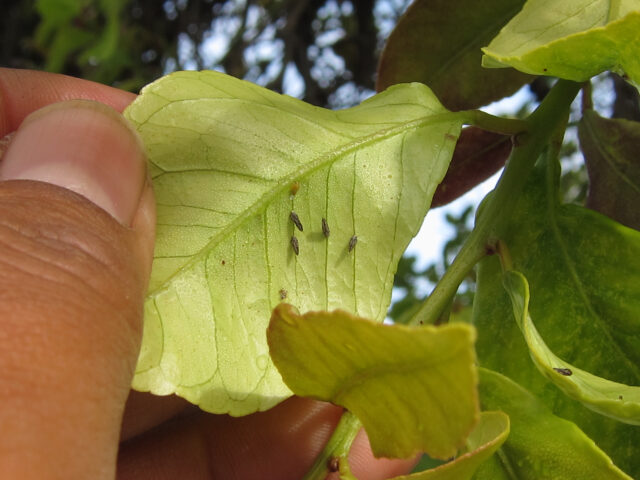Farm Credit has supported advocacy group’s efforts on behalf of industry for over 20 years
California Citrus Mutual, the advocacy arm of the state’s $3 billion a year citrus industry, works on behalf of growers on a wide range of issues, including water supply, labor and tariffs that limit exports to China and other nations.

But one of its most important roles is helping lead the fight to prevent a tiny insect known as the Asian citrus psyllid from getting a foothold in California’s 255,000 bearing acres of oranges, mandarins, lemons and grapefruit, said Citrus Mutual’s president and CEO, Casey Creamer.
“It’s wiping out the Florida citrus industry as we speak, so we’re now the No. 1 state by default. We advocate for funding to help find the cure,” Creamer said.
“We’re a small organization with a staff of six and some consultants, but annually we bring back funding on HLB alone (from the federal and state governments) totaling over $70 million a year. That’s something nobody else is going to be doing besides us.”
The tiny insect damages citrus trees by eating their leaves but is especially dangerous because it can carry bacteria from an infected tree to a healthy one, causing citrus greening disease. Also known by the Chinese name huanglongbing (HLB) – the disease first causes fruit to remain green and taste bitter, and eventually kills the tree.
For more than 20 years, Farm Credit organizations in California have come together to support Citrus Mutual as part of our broader support of agricultural advocacy efforts, said Kevin Ralph, California State President at AgWest Farm Credit.
“Since Citrus Mutual was founded in 1977, it has established itself as a leading advocate for the state’s citrus industry, and its work on preventing the spread of HLB and supporting research to find a cure for the disease has been immensely important,” Ralph said.
“Together, Farm Credit contributed nearly $1 million to farm-related nonprofits last year and we will continue to support these organizations as they engage in work to help our state’s farmers and ranchers feed the nation.”
Farm Credit organizations supporting Citrus Mutual are AgWest Farm Credit, American AgCredit, CoBank and Fresno Madera Farm Credit. These organizations are part of the nationwide Farm Credit System – the largest provider of credit to U.S. agriculture.
Fighting HLB is vital for California’s growers. By 2005, just seven years after the psyllid was first found in Florida, HLB had spread to most of the Sunshine State’s commercial citrus groves. Since then, the industry has shrunk by two-thirds, resulting in over $8 billion in economic losses and tens of thousands of lost jobs.
Fortunately, there has been progress. Researchers at the University of California, Riverside, are working on a promising method of using peptides from an Australian citrus tree that is resistant to the disease that can be injected or sprayed onto American citrus trees to allow the trees to survive infestation. Citrus Mutual helped obtain funding for that research as well, Creamer said.
Keith Hesterberg, President and CEO of Fresno Madera Farm Credit, said Citrus Mutual’s work is particularly important in the Central Valley, which is home to 80% of the state’s citrus groves.
“We’ve seen how devastating this disease has been to Florida’s farm economy, and it’s encouraging that research is progressing to find a potential cure,” Hesterberg said. “Education and research like this is a top priority for Farm Credit’s philanthropic efforts on behalf of the industry.”
Most citrus production occurs in the Sierra foothills from Madera south to Kern County, with significant production in Ventura and Santa Barbara counties and in Riverside and San Bernardino counties.
Creamer said sponsorships such as Farm Credit’s help support the entire Citrus Mutual organization and is particularly important to the success of its annual educational conference, which is free for members to attend. This year’s conference in March attracted about 1,000 people who were able to get the latest information about water, labor law, international trade and, of course, HLB.
“It’s the sponsors who put the conferences on. We couldn’t hold them without the help of our industry allies,” Creamer said. “And besides its sponsorship support, Farm Credit continues to service our members and protect their viability, keeping them afloat in tough times. That’s incredibly important.”
###
About Farm Credit:
AgWest Farm Credit, American AgCredit, CoBank and Fresno Madera Farm are cooperatively owned lending institutions providing agriculture and rural communities with a dependable source of credit. For more than 100 years, the Farm Credit System has specialized in financing farmers, ranchers, farmer-owned cooperatives, rural utilities and agribusinesses. Farm Credit offers a broad range of loan products and financial services, including long-term real estate loans, operating lines of credit, equipment and facility loans, cash management and appraisal and leasing services…everything a “growing” business needs. For a link to this article and for more information, visit www.farmcreditalliance.com
About California Citrus Mutual:
CCM is a voluntary, non-profit trade association representing California citrus growers on the economic, regulatory, and political issues that impact them most.






